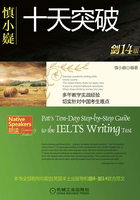
像native speakers一样思考支持句——你需要记住的3个词
每个分论点(即理由:idea)后面写的支持句是全文最能体现考生深入论证实力的部分(也就是写作考官们常说的real content),必须尽全力写好。
但是Pat却发现国内同学们普遍对于想supporting sentences感到“一头雾水”(clueless)。其实支持句的本质就是explain it in detail,只要明白了native speakers自己是怎样思考supporting sentences的,你就能立刻明白怎样让自己想出的支持句真正符合考官的期待了。
在英美的Academic Writing课堂上,教师们通常都是通过问学生这3个问题来启发学生思考支持句的:
Why?(为什么?)So?(那么会有什么结果?)
What?(这样讲的具体意思是什么?)
这3个思考支持句的提示问题既可以单独使用,也可以配合起来使用。我们来看实例:
1 请看这个分论点:
Playing violent video games can cause changes in young people's behaviour.玩暴力游戏会导致青少年的行为产生变化。
如果问自己Why?(为什么?)和So?(那么会有什么结果?),我们就可以这样写出它的支持句:
第1句支持句:
These games use a wide variety of(多种多样的)technology to make it fun to fight and kill.
第2句支持句:
They also teach young people to use violence to solve problems.
第3句支持句:
As a result(因此), many young players become aggressive(有攻击性的)towards their teachers, classmates and even their parents.
2 再来看这个比较抽象的分论点:
Extreme sports involve high risks.极限运动涉及到很高的风险。
如果问自己What?(这样讲的具体意思是什么?),我们就可以想出紧扣这个分论点的支持句:
第1句支持句:
They allow people to experience high speed or great height to bring them excitement.
第2句支持句:
For example, bungee jumpers need to jump from very high places.
第3句支持句:
They may be seriously injured if the equipment does not work well.
3 又比如这个分论点:
Art skills are not essential skills(核心技能)that most students will need when they enter the job market.
这个分论点有一定的道理,但是比较抽象,问自己What?(这样讲的具体意思是什么?),就可以得到支持句:
第1句支持句:
Most of them will not need to draw, paint or make sculptures at work.
第2句支持句:
Other skills, such as language, maths and computer skills, can help to prepare them better for their careers.
通过这两个支持句的解释,本来比较抽象的分论点就变得具体、容易理解了。
特别提示
IELTS作文里回答What?问题,对分论点进行解释时,并不需要像维基百科那么“严丝合缝”,只要解释有一定的合理性,就已经是有效的supporting sentences了。